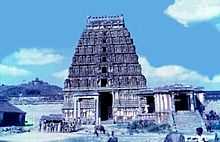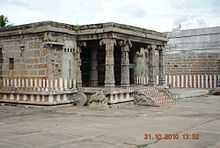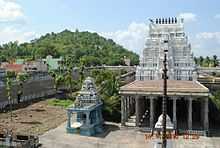Periyanayagi Amman Temple
The Periyanayagi Ammam Temple situated in the center of Devikapuram village. This temple is built by the Vijayanagara Emperor in the 14th century. This is the second largest temple after Tiruvannamalai Arunachaleswarar Temple. The consort of Sri Kanakagiriswarar installed at the hill temple is Sri Periyanayagi Amman, found at the bottom. She is also otherwise known as Sri Brahanayagi and Sri Brahadhambal. There is no Sivalingam here. Here the temple is 475 feet east to west and 250 feet south to north, with a fortrees o 30 feet in height. The temple covers an area of 3 acres and has a big seven tiered pagado. The fortress of the temple is beautifully fashioned out of artistically carved granite stones. On the outer walls, there are several carvings, a separate line for Horse, Bull and pig all around the wall. The images of the pigs might have been intended to create sentimental feelings among Muslim invaders and to avoid their destroying the temples. There are there entrances leading to the temple in the north, south and east. The north and south entrances are closed for the devotees. The eastern in front of it, there is a high four pillared mandapam. Adjacent to it, is the "Thermutti Mandapam" Unlike other mandapams, which will have only a single flight of steps on one side, here there are tow flights of steps on both sides.

In the entrance of the temple, beautiful sculpture. Some of the sculpture were destroyed by the Muslim invaders. After the entrance, there are three prakarams in the temple. Immediately after entering the temple, one would find Sri Veerabadrar on the south and Sri Bairavar on the north. The Brahma Theertham is on the southern side of the temple with beautiful foot steps and a circular platform. The Kalyana Mandapam is found in the north facing south. This is designed in the shape of the two wheeled car drawn by horses which is very impressive and attractive. There are several architectural carvings on the pillars of this mandapam depicting the history of the King Sri Manu Needhi Cholan.
There is a 36-pillared front mandapam beyond the Bali Peedam, Kodimaram and Nadhi. This mandapam is an encyclopedia of Sculptures because 432 sculpture describes the puranams of Siva, Vishnu and devi. To the south of this mandapam is the Vinayagar Sannidhi and to the north of it, the Sannidhi of Sri Arumugar. Crossing this mandapam, and the entrance of a three tiered pagoda, one has to reach the next prakaram. The Sanidhis of Sri Kasi Viswanathar, Sri Pillaiyar and the Navarathir mandapam are found in this prakaram. The utsava vigrahams of Sri Vinayagar, Natarajar and Samaskandhar are foundin the Maha Mandapam. Next ot the Maha Mandapam is the inner prakaram of the temple. The beautiful dharshan of Devik Sri Perianayagi ambal, the embodiment of love and affection can be seen in the sanctum sanctorum. Large number of devotees used to have dharashan and worship the Devi on all Fridays.
There are several sacred theerthas in this shrine. The brahma theertham is inside the temple while the Navagraha Theertham is located at the foot of the hill which is now known as Periayappan kulam. To the south east of this sthalam is the Agni Theertham with Neerazhi Mandapam at its centre. People call this Agni Theertham as Kaatan kulam. There is a Murugar Temple at the top of a hill lock on the bank of theis Agni Theertham and to the west corner is the Devaraidyar Theertham and to the west the seyyyan kulam or seeyan kulam. There are also several other small Theerthams here all round the hill. On all Tuesday it is customary for the devotees to come around the hill and offer worship to Sri Kanakagiriswarar. By doing so, it is believed that the devotees who are suffering from incurable diseases are easily cured.

There are about 56 stone inscriptions in this sthalam of which 55 are found in the Periyanayagi Amman temple and one in the Kanakagiriswarar Temple at the top of the hill. It is surmised that both these shirines should have been built during the regimes of the Vijayanagar kings. One of the oldest stone inscriptions relates to the Maharashtra king another belongs to the Jagirdhar of Arni and the remaining 53 stone inscriptions relate to the period of the Vijayanagar Kings. Two of the inscriptions are found in Sanskrit, one in Marathi and the rest in Tamil.

| Wikimedia Commons has media related to Periyanayagi Amman Temple. |